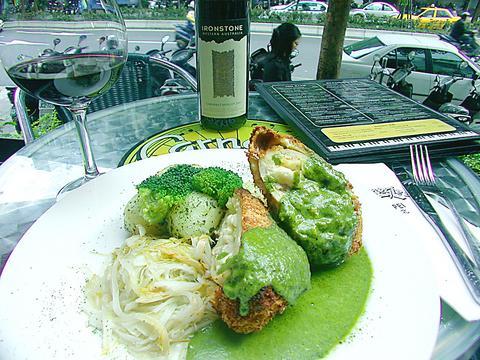If you took away the bar and dancing girls from Carnegie's you would still have a good restaurant, as a good crowd asking for tables showed at lunchtime earlier in the week. Clearly, there is something that Carnegie's does better than anyone else and that would seem to be taking care of the details.
While even relatively good restaurants in Taipei come and go, Carnegie's is here for the long run because it succeeds on four levels: First, there is the bar, which needs little introduction; then there are the club nights on Wednesday, Friday and Saturday; the tea time set of cakes and coffees in the afternoon ("Starbucks with ashtrays," is how general manager Bob Marshall described it); and last, but certainly not least, the food.
The menu is extensive and caters to a range of tastes. Whether you want to nibble on bar favorites such as quesadillas (NT$240) or mixed spicy sausages, or tuck in to a large fillet of North Sea cod in a crispy beer batter with thick-cut French fries, mushy peas and salad (NT$450), Carnegie's provides.

PHOTO: JULES QUARTLY, TAIPEI TIMES
There are eight starters, 14 main courses and four desserts on the a la carte part of the menu. Added to this are six types of salads and five items in the innovative British "Traditional Pub Fayre" section, including liver and onions (NT$330) and shepherds pie (NT$360). There is also a comprehensive selection of pasta dishes and five rice-and-curry dishes to choose from, including a chicken biryani (NT$390), which is earning rave reviews from the English ex-pat community.
We chose the chicken and mushroom pie (NT$360), rolled chicken breast (NT$450) and grilled port medallions (NT$490), all of which were larger than generous portions. Each meal came with its own tailored vegetable selection, so the pork came with red cabbage and apple sauce, flavored with cloves and nutmeg. The breaded and rolled chicken and goat's cheese arrived with caramelized Belgian endives and boiled potatoes, which complemented the pesto sauce. The chicken pie arrived with a large puff pastry crust and a selection of vegetables with mashed potatoes.
Marshall said the menu was changed in October and food sales went up 35 percent since then. "There has been a lot of development. It has been really successful. Basically, we wanted to put food on the menu that we wanted to eat ourselves."

June 9 to June 15 A photo of two men riding trendy high-wheel Penny-Farthing bicycles past a Qing Dynasty gate aptly captures the essence of Taipei in 1897 — a newly colonized city on the cusp of great change. The Japanese began making significant modifications to the cityscape in 1899, tearing down Qing-era structures, widening boulevards and installing Western-style infrastructure and buildings. The photographer, Minosuke Imamura, only spent a year in Taiwan as a cartographer for the governor-general’s office, but he left behind a treasure trove of 130 images showing life at the onset of Japanese rule, spanning July 1897 to

In an interview posted online by United Daily News (UDN) on May 26, current Chinese Nationalist Party (KMT) Chairman Eric Chu (朱立倫) was asked about Taichung Mayor Lu Shiow-yen (盧秀燕) replacing him as party chair. Though not yet officially running, by the customs of Taiwan politics, Lu has been signalling she is both running for party chair and to be the party’s 2028 presidential candidate. She told an international media outlet that she was considering a run. She also gave a speech in Keelung on national priorities and foreign affairs. For details, see the May 23 edition of this column,

The Taiwan People’s Party (TPP) on May 18 held a rally in Taichung to mark the anniversary of President William Lai’s (賴清德) inauguration on May 20. The title of the rally could be loosely translated to “May 18 recall fraudulent goods” (518退貨ㄌㄨㄚˋ!). Unlike in English, where the terms are the same, “recall” (退貨) in this context refers to product recalls due to damaged, defective or fraudulent merchandise, not the political recalls (罷免) currently dominating the headlines. I attended the rally to determine if the impression was correct that the TPP under party Chairman Huang Kuo-Chang (黃國昌) had little of a

At Computex 2025, Nvidia CEO Jensen Huang (黃仁勳) urged the government to subsidize AI. “All schools in Taiwan must integrate AI into their curricula,” he declared. A few months earlier, he said, “If I were a student today, I’d immediately start using tools like ChatGPT, Gemini Pro and Grok to learn, write and accelerate my thinking.” Huang sees the AI-bullet train leaving the station. And as one of its drivers, he’s worried about youth not getting on board — bad for their careers, and bad for his workforce. As a semiconductor supply-chain powerhouse and AI hub wannabe, Taiwan is seeing